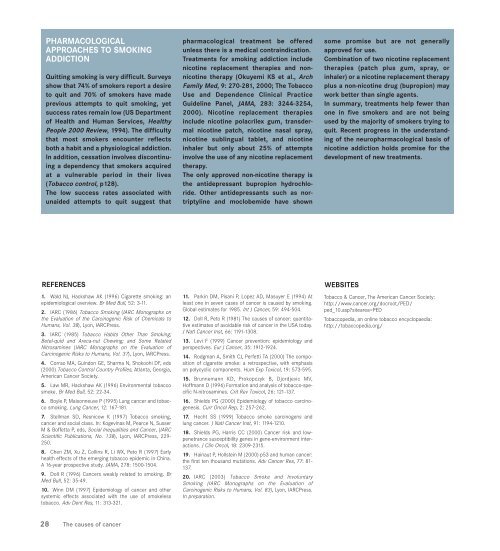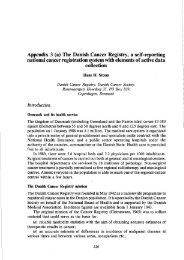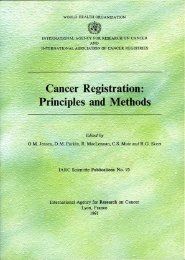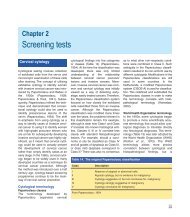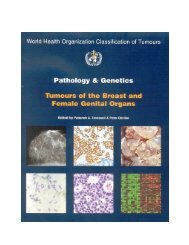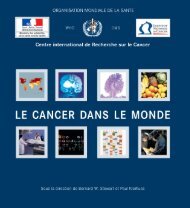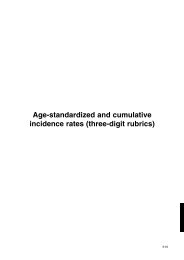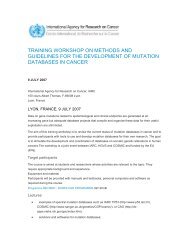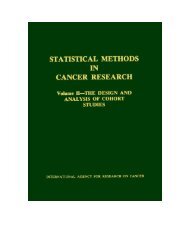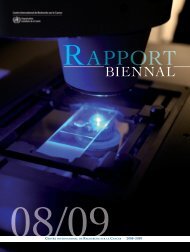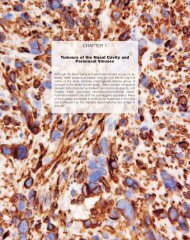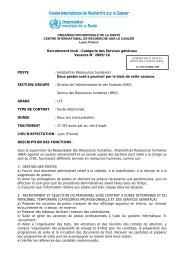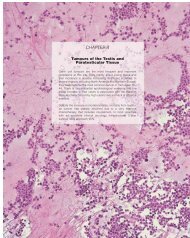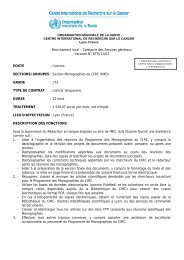world cancer report - iarc
world cancer report - iarc
world cancer report - iarc
Create successful ePaper yourself
Turn your PDF publications into a flip-book with our unique Google optimized e-Paper software.
PHARMACOLOGICAL<br />
APPROACHES TO SMOKING<br />
ADDICTION<br />
Quitting smoking is very difficult. Surveys<br />
show that 74% of smokers <strong>report</strong> a desire<br />
to quit and 70% of smokers have made<br />
previous attempts to quit smoking, yet<br />
success rates remain low (US Department<br />
of Health and Human Services, Healthy<br />
People 2000 Review, 1994). The difficulty<br />
that most smokers encounter reflects<br />
both a habit and a physiological addiction.<br />
In addition, cessation involves discontinuing<br />
a dependency that smokers acquired<br />
at a vulnerable period in their lives<br />
(Tobacco control, p128).<br />
The low success rates associated with<br />
unaided attempts to quit suggest that<br />
REFERENCES<br />
1. Wald NJ, Hackshaw AK (1996) Cigarette smoking: an<br />
epidemiological overview. Br Med Bull, 52: 3-11.<br />
2. IARC (1986) Tobacco Smoking (IARC Monographs on<br />
the Evaluation of the Carcinogenic Risk of Chemicals to<br />
Humans, Vol. 38), Lyon, IARCPress.<br />
3. IARC (1985) Tobacco Habits Other Than Smoking;<br />
Betel-quid and Areca-nut Chewing; and Some Related<br />
Nitrosamines (IARC Monographs on the Evaluation of<br />
Carcinogenic Risks to Humans, Vol. 37), Lyon, IARCPress.<br />
4. Corrao MA, Guindon GE, Sharma N, Shokoohi DF, eds<br />
(2000) Tobacco Control Country Profiles, Atlanta, Georgia,<br />
American Cancer Society.<br />
5. Law MR, Hackshaw AK (1996) Environmental tobacco<br />
smoke. Br Med Bull, 52: 22-34.<br />
6. Boyle P, Maisonneuve P (1995) Lung <strong>cancer</strong> and tobacco<br />
smoking. Lung Cancer, 12: 167-181.<br />
7. Stellman SD, Resnicow K (1997) Tobacco smoking,<br />
<strong>cancer</strong> and social class. In: Kogevinas M, Pearce N, Susser<br />
M & Boffetta P, eds, Social Inequalities and Cancer, (IARC<br />
Scientific Publications, No. 138), Lyon, IARCPress, 229-<br />
250.<br />
8. Chen ZM, Xu Z, Collins R, Li WX, Peto R (1997) Early<br />
health effects of the emerging tobacco epidemic in China.<br />
A 16-year prospective study. JAMA, 278: 1500-1504.<br />
9. Doll R (1996) Cancers weakly related to smoking. Br<br />
Med Bull, 52: 35-49.<br />
10. Winn DM (1997) Epidemiology of <strong>cancer</strong> and other<br />
systemic effects associated with the use of smokeless<br />
tobacco. Adv Dent Res, 11: 313-321.<br />
28 The causes of <strong>cancer</strong><br />
pharmacological treatment be offered<br />
unless there is a medical contraindication.<br />
Treatments for smoking addiction include<br />
nicotine replacement therapies and nonnicotine<br />
therapy (Okuyemi KS et al., Arch<br />
Family Med, 9: 270-281, 2000; The Tobacco<br />
Use and Dependence Clinical Practice<br />
Guideline Panel, JAMA, 283: 3244-3254,<br />
2000). Nicotine replacement therapies<br />
include nicotine polacrilex gum, transdermal<br />
nicotine patch, nicotine nasal spray,<br />
nicotine sublingual tablet, and nicotine<br />
inhaler but only about 25% of attempts<br />
involve the use of any nicotine replacement<br />
therapy.<br />
The only approved non-nicotine therapy is<br />
the antidepressant bupropion hydrochloride.<br />
Other antidepressants such as nortriptyline<br />
and moclobemide have shown<br />
11. Parkin DM, Pisani P, Lopez AD, Masuyer E (1994) At<br />
least one in seven cases of <strong>cancer</strong> is caused by smoking.<br />
Global estimates for 1985. Int J Cancer, 59: 494-504.<br />
12. Doll R, Peto R (1981) The causes of <strong>cancer</strong>: quantitative<br />
estimates of avoidable risk of <strong>cancer</strong> in the USA today.<br />
J Natl Cancer Inst, 66: 1191-1308.<br />
13. Levi F (1999) Cancer prevention: epidemiology and<br />
perspectives. Eur J Cancer, 35: 1912-1924.<br />
14. Rodgman A, Smith CJ, Perfetti TA (2000) The composition<br />
of cigarette smoke: a retrospective, with emphasis<br />
on polycyclic components. Hum Exp Toxicol, 19: 573-595.<br />
15. Brunnemann KD, Prokopczyk B, Djordjevic MV,<br />
Hoffmann D (1996) Formation and analysis of tobacco-specific<br />
N-nitrosamines. Crit Rev Toxicol, 26: 121-137.<br />
16. Shields PG (2000) Epidemiology of tobacco carcinogenesis.<br />
Curr Oncol Rep, 2: 257-262.<br />
17. Hecht SS (1999) Tobacco smoke carcinogens and<br />
lung <strong>cancer</strong>. J Natl Cancer Inst, 91: 1194-1210.<br />
18. Shields PG, Harris CC (2000) Cancer risk and lowpenetrance<br />
susceptibility genes in gene-environment interactions.<br />
J Clin Oncol, 18: 2309-2315.<br />
19. Hainaut P, Hollstein M (2000) p53 and human <strong>cancer</strong>:<br />
the first ten thousand mutations. Adv Cancer Res, 77: 81-<br />
137.<br />
20. IARC (2003) Tobacco Smoke and Involuntary<br />
Smoking (IARC Monographs on the Evaluation of<br />
Carcinogenic Risks to Humans, Vol. 83), Lyon, IARCPress.<br />
In preparation.<br />
some promise but are not generally<br />
approved for use.<br />
Combination of two nicotine replacement<br />
therapies (patch plus gum, spray, or<br />
inhaler) or a nicotine replacement therapy<br />
plus a non-nicotine drug (bupropion) may<br />
work better than single agents.<br />
In summary, treatments help fewer than<br />
one in five smokers and are not being<br />
used by the majority of smokers trying to<br />
quit. Recent progress in the understanding<br />
of the neuropharmacological basis of<br />
nicotine addiction holds promise for the<br />
development of new treatments.<br />
WEBSITES<br />
Tobacco & Cancer, The American Cancer Society:<br />
http://www.<strong>cancer</strong>.org/docroot/PED/<br />
ped_10.asp?sitearea=PED<br />
Tobaccopedia, an online tobacco encyclopaedia:<br />
http://tobaccopedia.org/


